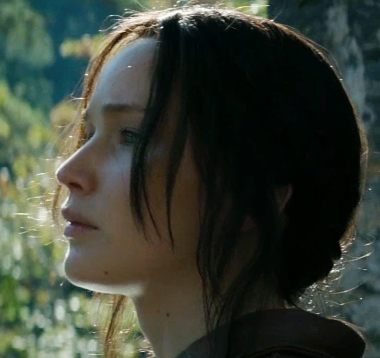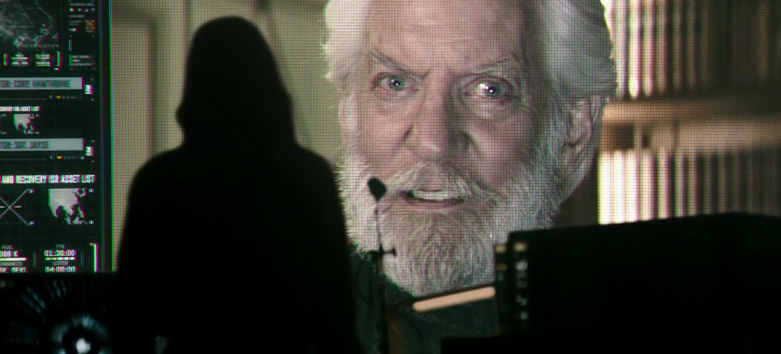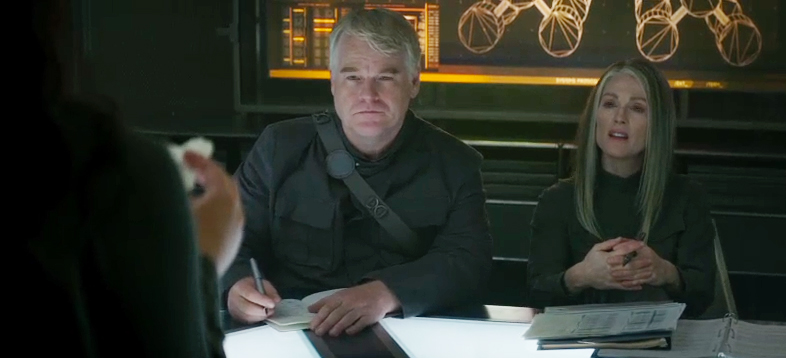 Michael C here with what I suppose is part one of my review of Mockingjay.
Michael C here with what I suppose is part one of my review of Mockingjay.
“I wish she were dead,” says Finnick Odair at the start of the third entry in the Hunger Games series. “I wish they were all dead and we were too,” he adds to include himself, Katniss, and all the tributes that remain in the clutches of the Capitol after the events of Catching Fire.
If that seem like a dispiriting way to start an action blockbuster rest assured it perfectly establishes the tone of The Hunger Games: Mockingjay – Part 1, a grim, disjointed film that is short on thrills and long on misery. Francis Lawrence’s sequel progresses from torture to bombs dropped on hospitals to the wreckage of towns strewn with skulls, all of it scrubbed down to a bloodless PG-13. Our big reward for wading through this suffering is to see our beloved Katniss strangled within an inch of her life.
I expect fans of the series will like it a lot...
It has been clear form the start that the mission statement of the Hunger Games franchise has been to produce a straight-down-the-middle Xerox of the books with as little zigging and zagging as possible. The biggest deviation from page to screen has been to sand down the source material’s sharper edges and phase out its idiosyncrasies because apparently a story about children being forced to slaughter each other as a form of entertainment should have the broadest possible appeal. The result has been films that look and sound much as we imagined but which are missing the spark of life.
The first two films skated by because they had the spectacle of the games to occupy our attention. Now that the first half of Mockinjay fails to provide a similar spectacle the underlying hollowness of these adaptations is laid bare. For a film about the unstoppable momentum of revolution Mockingjay has little sense of mounting danger. But then who has time to worry about such niceties as pacing and depth of soul when we can all compare notes on how close Julianne Moore’s President Coin looks to our mental image from the books?
It’s a shame the filmmakers aim so squarely for the adequate because Collins’ books provided the material to make one hell of a fascinating movie. Even with the lackluster execution it remains a remarkably atypical mainstream release with its emphasis on abstract political concepts over action. Mockingjay picks up with Katniss in the underground headquarters of the previously mythical District 13, now in open war against the Capitol. Mockingjay hinges on which side can deploy their propaganda star most effectively. The rebellion pins its hopes on Katniss’s symbolic power to galvanize the twelve districts into action, a position the prickly and camera-shy champion resists. The Capitol uses the captured Peetah in a series of gun-to-his-head interviews imploring the public to stop the violence. It’s a stunning trick to play on audiences, to prime them on action extravaganzas only to swerve into such cerebral areas. Mockingjay’s themes of free thought versus government oppression actually have a lot in common with Jon Stewart’s Rosewater, currently playing to roughly 1/1000th the box office.
Of course, it is only by accident that the studio released such an oddity. Mockingjay would have had an action set piece to top them all were it not for the mercenary decision to chop the story down the middle, forcing the fans to eat their veggies in this half before they get there dessert in the next. There is nothing fundamentally wrong with the idea adapting a book series in some ratio other than 1 book = 1 movie. Indeed, there is so much rich material in Mockingjay that is only fleetlingly touched upon that one could imagine a third movie being adapted out of Mockingjay without much trouble. But then the key word there is adapted, which we all know is verboten now that Harry Potter and Twilight have demonstrated that making a fetish of obsequious fidelity to source material is the path to maximum box office dollars. So instead of shaping the material into two films they just made one big movie and hacked it in two with all the grace of a Civil War surgeon sawing off a limb. The result is an ungainly film, which still manages to feel underdeveloped despite the extra breathing room.
 The biggest victim of this calculation is Katniss herself. At one point Woody Harrelson’s Haymitch leads a strategy meeting to remind everyone why they liked Katniss in the first place and we can understand why they might forget. The courageous character we fell in love with in the first two films spends most of Mockingjay on the sidelines being pushed and pulled by powerful forces. The book was able to balance this with Katniss’s internal thoughts and later scenes of Katniss taking action. In this truncated version the appeal of her character gets lost. Lawrence is gifted actress and an even better movie star, but she is boxed in here with nothing to do but alternate between angry, sullen, and traumatized. I lost count of how many scenes require her to do nothing but watch events unfold on a screen with mounting horror.
The biggest victim of this calculation is Katniss herself. At one point Woody Harrelson’s Haymitch leads a strategy meeting to remind everyone why they liked Katniss in the first place and we can understand why they might forget. The courageous character we fell in love with in the first two films spends most of Mockingjay on the sidelines being pushed and pulled by powerful forces. The book was able to balance this with Katniss’s internal thoughts and later scenes of Katniss taking action. In this truncated version the appeal of her character gets lost. Lawrence is gifted actress and an even better movie star, but she is boxed in here with nothing to do but alternate between angry, sullen, and traumatized. I lost count of how many scenes require her to do nothing but watch events unfold on a screen with mounting horror.
It doesn’t help the franchise has never had a clue how to dramatize Katniss’s internal struggles. This is the reason the film’s supposed romantic tension is DOA. Left to portray something that can’t be explained in expository dialogue Mockinjay flatlines. What is Katniss thinking about these two men, her only friends, both in love with her? Does she love both? Neither? Is she too occupied with survival to even think of romance? Does she prefer one but is afraid to risk losing the friendship of the other? Who knows. Go read the books.
The odds favor Mockinjay: Part 1 ending up the top-grossing movie of 2014. Looking over past films to have earned that distinction is to have a stream classic moments come quickly to mind. The water vibrations in Jurassic Park or the Batwing silhouetted against the moon. Even schlock like Independence Day is indelible schlock. It’s hard to imagine what we might remember from Mockingjay a decade or two down the road. A year later Catching Fire is already a hazy memory and writing this a few days on from my screening I find Mockingjay fading as well. It’s not a terrible film. The prevailing level of quality reached by The Hunger Games: Mockingjay: Part 1 is “good enough”. But it’s getting hard to cheer for good enough.

Miss Everdeen, it's the things we love most that destroy us.
Grade: C
Oscar Chances: Nil. If the first two films couldn't manage a single nomination between them.
